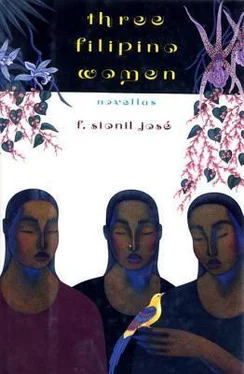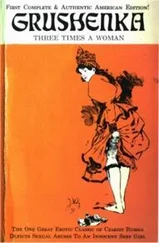Francisco Jose - Three Filipino Women
Здесь есть возможность читать онлайн «Francisco Jose - Three Filipino Women» весь текст электронной книги совершенно бесплатно (целиком полную версию без сокращений). В некоторых случаях можно слушать аудио, скачать через торрент в формате fb2 и присутствует краткое содержание. Год выпуска: 2013, ISBN: 2013, Издательство: Random House Publishing Group, Жанр: Современная проза, на английском языке. Описание произведения, (предисловие) а так же отзывы посетителей доступны на портале библиотеки ЛибКат.
- Название:Three Filipino Women
- Автор:
- Издательство:Random House Publishing Group
- Жанр:
- Год:2013
- ISBN:978-0-307-83028-9
- Рейтинг книги:4 / 5. Голосов: 1
-
Избранное:Добавить в избранное
- Отзывы:
-
Ваша оценка:
- 80
- 1
- 2
- 3
- 4
- 5
Three Filipino Women: краткое содержание, описание и аннотация
Предлагаем к чтению аннотацию, описание, краткое содержание или предисловие (зависит от того, что написал сам автор книги «Three Filipino Women»). Если вы не нашли необходимую информацию о книге — напишите в комментариях, мы постараемся отыскать её.
and
-examine the Philippine experience through the lives of three female characters, a prostitute, a student activist, and a politician.
Three Filipino Women — читать онлайн бесплатно полную книгу (весь текст) целиком
Ниже представлен текст книги, разбитый по страницам. Система сохранения места последней прочитанной страницы, позволяет с удобством читать онлайн бесплатно книгу «Three Filipino Women», без необходимости каждый раз заново искать на чём Вы остановились. Поставьте закладку, и сможете в любой момент перейти на страницу, на которой закончили чтение.
Интервал:
Закладка:
“Just remember this,” I said instead. “In a world grown dark with deceit there are many who are blinded and few who can hold up a light so that we can see the way. More important, so that we can look at ourselves, as well as others, and know how different or similar we are to the herd.”
She was bright with figures but the soft talk of the humanities bored her and I was now talking elusively, because I did not want to call her a prostitute to her face.
“You’re flattering yourself,” she said. “You want to tell me that you are bringing light to dark corners with your kind of truth and that if I see the light, I will change?”
“No,” I said. “That is not what I meant. I know well enough that I am cynical. But I am also religious because I am a sinner. Not many can say this of themselves. I accept certain realities which I cannot change. I am not trying to give you a sermon.”
“But you are, you know,” she said with a turn of the lovely mouth that was almost a sneer. “You’re trying to say that I am not a moral person, that you look down on me and, therefore, I should feel guilty …”
I did not speak; she knew she was right.
“You and your pompous values,” she laughed quietly. “How can you be so dumb. We are not different, we are very much alike. Go before a mirror, Roly. Ask yourself how you have behaved during the last ten years, or even just during the last ten days. We are alike, I repeat. I sell mine — and you — you sell yourself.”
TWO
As Ermi had bitterly suggested, that evening, I went to the mirror — this pallid face, the lines beginning to form around the nose, the wrinkles deepening on the forehead, the graying around the temples more pronounced. I had thought of dyeing my hair but I was just too egoistical to do it, assuring myself that a man is as young as he feels. I asked this man in the mirror, now in the inevitable grasp of middle age, if he was a prostitute, too, and I scanned the bleak terrain of his past, the years with B.G. Collas when he used to sell everything, including soft drinks, with the habiliments of nationalism. So then, Rolando Cruz, Ph.D. in history, do you recall how you composed advertising copy embellished with your knowledge of your country’s past? The hortatory speeches you wrote for corporate and government hierarchs who did not really know, much less believe, what you put in their mouths? I justified these as providing my family a home, a good education for the children, a future that would not be wracked by the dismal insecurity and unhappiness that I had known as a boy.
I was now humbled, devastated even by what Ermi had told me. As my conscience, I must see her again. Now, she was behind my mind, insinuating herself, a nagging, unsettling subconscious. I could not concentrate on what was important at hand. I had a staff of about thirty but I had to read all the final reports and correct them if necessary. I initiated research. My foreign clients wanted background on labor conditions, availability of raw materials, political leaders and options for influencing them, loopholes in government procedures and investment laws, taxes — all the information they needed to make profits without sweating.
What had Ermi cast over me? A net? Perhaps a medieval spell, or an aswang talisman which would cripple me if I did not run or persevere in cutting myself away from all that reminded me of her. This was, of course, impossible. Everywhere I turned were new restaurants, bars, massage parlors which had started to proliferate and, later on, the new hotels.
Indeed, how Ermita had changed! Marcelo H. del Pilar Street — what would that self-effacing, courageous propagandist say now if he saw that the street named after him had become “sin avenue” festooned with the glitter and shine of pick-up bars. My own Mabini, named after that stubborn and unswerving ideologue of the revolution, has become a raucous arcade of souvenir shops and that genre painting for tourists which portrayed the Philippines as a land of pouring sunlight, elegiac harvestime, wide-eyed children and forever enchanting village girls.
Once upon a time, the whole Ermita area was the precinct of the mestizo elite. Plaza Militar and its environs, which I could see from my window, were the compounds of the American aristocracy. These streets were lined with acacias then and behind the high walls of ivy, in the august mansions, was a sybaritic life devoid of the anxieties of colonialism. Then the war came and Ermita was leveled; the mestizos and the colonialists left it to form another ilustrado enclave in a former grassland called Makati. And their abandoned mansions which were spared, now decrepit and ill preserved, had become tawdry love motels.
How could I ignore Ermi? How could I stop breathing? She was now embedded in my mind, a part of me. I could no longer think. My job demanded a mind free from all these impediments that made it impossible to relate cause and effect.
Cause and effect! There was nothing I did which excluded her. If I went to an appointment in the afternoon or in the evening, would it enable me to pass by Camarin so that I could see her before someone took her out? She had by now a good clientele. There were many offers, she told me, to make her a full-time mistress, to be “garaged” as the expression went, but she was familiar with the liabilities that arose from such arrangements. But what really vexed me was the fact that though she could afford to quit, she still persisted.
I started taking meditation lessons. Indeed, after a half hour of contemplating my feet, my mind would be rid of junk and all thoughts of Ermi that bedeviled me. But only for a while. Soon enough she intruded again. I realized then that I would have to leave Manila — even just for a few weeks — time enough to flee the single subject that had begun to canker me.
The first stop was Honolulu. Lolling on the beach at Ala Moana enabled me to think soberly not only of her but of Manila. It was beginning to wobble under the accretion of ancient problems, a radicalized youth movement battering at the hoary walls of privilege, including the multinationals which I represented and defended. I had sympathized with the demands for change but my bread did not come from kids who massed at the American embassy and rampaged in the streets of Ermita, smashing shop windows and splattering their vaulting slogans on the walls.
I had brought my notes on sexuality and began to work on them, particularly those about the lesbians and transvestites with whom Didi had put me in touch. I was amused, remembering an “international fashion show” by the transvestites at a UN Avenue auditorium the week I left. They were all dolled up and even under those lights, no one would have thought they were men.
Honolulu was, of course, wide open to the changes in sexual mores that had transformed much of American society, perhaps fundamentally. More so was San Francisco which had become the gay capital of America. But my interests were centered on home. America eddied around me, distant, impermeable. I was not involved.
A month in the United States, a month in South America which pitched me up the heights of Machu Picchu, and also one month in Europe — with the exotic food, one-night stands — and I instead — continued to marvel at what had happened in Manila. Had I procrastinated, I would have been enslaved by emotions I could no longer control. Now, I wanted to find something I could latch on to, not just history which had fired me in the past, but something equally immaterial, some ideal that would sustain me in this solitary middle age.
The pleasant deviations in New York, the cherry stone clams at Nathan’s, the juiciest steaks at Gallaghers, all the sensual pleasures of Babylon did not, however, waylay memory. I had hoped it would be easy to forget Ermi but the distance only served to heighten my loneliness, my desire to be with her again. What did I recall of our talks? She did tell me she was good at math. Yes, she loved chocolates although sometimes too lazy even just to take the tinsel wrapping off Hershey’s Kisses before putting them into her mouth. I began to suspect that, perhaps, I was a masochist, that I was getting satisfaction from the agony that I was undergoing. It was when I slept that I should have had some peace but she obtruded in my dreams.
Читать дальшеИнтервал:
Закладка:
Похожие книги на «Three Filipino Women»
Представляем Вашему вниманию похожие книги на «Three Filipino Women» списком для выбора. Мы отобрали схожую по названию и смыслу литературу в надежде предоставить читателям больше вариантов отыскать новые, интересные, ещё непрочитанные произведения.
Обсуждение, отзывы о книге «Three Filipino Women» и просто собственные мнения читателей. Оставьте ваши комментарии, напишите, что Вы думаете о произведении, его смысле или главных героях. Укажите что конкретно понравилось, а что нет, и почему Вы так считаете.












